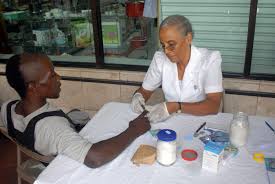Cause of High Blood Sugar
High Blood Sugar (Hyperglycemia) Topic Guide – eMedicineHealth
www.emedicinehealth.com › … › high blood sugar hyperglycemia article
Whenever the glucose (sugar) level in one’s blood rises high temporarily, this condition is known as hyperglycemia. The opposite condition, low blood sugar, is called hypoglycemia.
Glucose comes from most foods, and the body uses other chemicals to create glucose in the liver and muscles. The blood carries glucose (blood sugar) to all the cells in the body. To carry glucose into the cells as an energy supply, cells need help from insulin. Insulin is a hormone made by the pancreas, an organ near the stomach.
The pancreas releases insulin into the blood, based upon the blood sugar level. Insulin helps move glucose from digested food into cells. Sometimes, the body stops making insulin (as in type 1 diabetes), or the insulin does not work properly (as in type 2 diabetes). In diabetic patients, glucose does not enter the cells sufficiently, thus staying in the blood and creating high blood sugar levels.
 Blood sugar levels can be measured in seconds by using a blood glucose meter, also known as a glucometer. A tiny drop of blood from the finger or forearm is placed on a test strip and inserted into the glucometer. The blood sugar (or glucose) level is displayed digitally within seconds.
Blood sugar levels can be measured in seconds by using a blood glucose meter, also known as a glucometer. A tiny drop of blood from the finger or forearm is placed on a test strip and inserted into the glucometer. The blood sugar (or glucose) level is displayed digitally within seconds.
Blood glucose levels vary widely throughout the day and night in people with diabetes. Ideally, blood glucose levels range from 90 to 130 mg/dL before meals, and below 180 mg/dL within 1 to 2 hours after a meal. Adolescents and adults with diabetes strive to keep their blood sugar levels within a controlled range, usually 80-150 mg/dL before meals. Doctors and diabetes health educators guide each patient to determine their optimal range of blood glucose control.
When blood sugar levels remain high for several hours, dehydration and more serious complications can develop. Moreover, even mild hyperglycemia (a fasting blood sugar over 109 mg/dL in adolescents/adults or over 100 mg/dL in children before puberty) – when unrecognized or inadequately treated for several years – can damage multiple tissues in the brain, kidneys, and arteries. When hyperglycemia is associated with the presence of ketones in the urine, this state demands immediate medical attention. When blood sugar levels rise and stay high (over 165 mg/dL consistently) for days to weeks, diabetes should be suspected and treatment initiated.
High blood sugar level fluctuations occur daily in people with diabetes. It is important to control blood sugar levels through diet, exercise, and medication (if prescribed), to know the symptoms of elevated blood sugar, and to seek treatment, when necessary.
What Causes High Blood Sugar And What Harm Can It Do To My …
abcnews.go.com/Health/DiabetesOverview/story?id=3843485
Diabetes is a condition where the glucose or sugar levels are too high in the blood. Now, there are many reasons why the blood sugar levels get too high in people with diabetes, but I will only mention the two main defects now.
The first is that the pancreas, which is an important endocrine organ in our bodies, does not secrete enough insulin. Insulin is the hormone that helps glucose go from the bloodstream into the cells of our body to be used for energy.
A complicated condition called insulin-resistance is the second main cause of diabetes. Insulin-resistance, which occurs primarily in type 2 diabetes, is when the cells of our body are resistant to the glucose-lowering effects of insulin. If an individual has either not enough insulin and/or insulin-resistance, then high blood sugar levels or diabetes will be present.
High blood sugar levels if untreated will cause short-term effects and long-term complications. High blood sugar levels over the short term do not cause any damage to the organs of your body, however they will cause you to feel tired and weak, be thirsty, and urinate a lot, be susceptible to infections and have blurry vision.
In fact in the elderly, high blood sugar levels can lead to dehydration, electrolyte imbalance, and lead to falls and of course we know getting a broken hip as an elderly individual can be pretty devastating.
